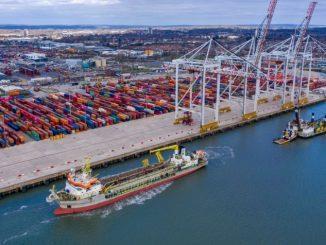
DP World’s container terminal at Southampton delivered a record 55% reduction in net carbon emissions from its fleet and installations in 2022, the global supply chain logistics group has revealed.
The cut in carbon emissions was aided by Southampton becoming the first UK port to eliminate fossil diesel from its operations entirely and transition to hydrotreated vegetable oil (HVO) last April.
DP World estimates the switch from diesel to HVO at the port saves around 14,000 tons of carbon dioxide annually – the equivalent of taking more than 8,000 family cars off the roads.
Steve McCrindle, DP World’s port operations director at Southampton, said: “We are delighted by the progress we have made on our green journey since moving to sustainable HVO last April.
Read more
- DP World Southampton slashes emissions by replacing diesel with HVO
- DP World launches intermodal rail service between London Gateway and Southampton terminals
- DP World sees record rise in volumes at London Gateway and Southampton hubs
“The transition away from fossil diesel means that the overwhelming majority of the fuel used at Southampton now comes from a green and renewable source.
“We will use HVO for the entirety of 2023 and therefore expect a further 35% net reduction in carbon emissions from our fleet and installations by the end of the year, making for a 90% reduction compared with 2021.
“This sector-leading performance shows our commitment to playing our part in helping the UK meet its net zero 2050 policy.”
DP World said that the Southampton container terminal already has the highest proportion of containers moved by rail in the UK - up to 30% - which, combined with London Gateway, sees around 300,000 trucks taken off UK roads each year.
For more stories tracking the industry journey to decarbonisation see our new Freight Carbon Zero website.













